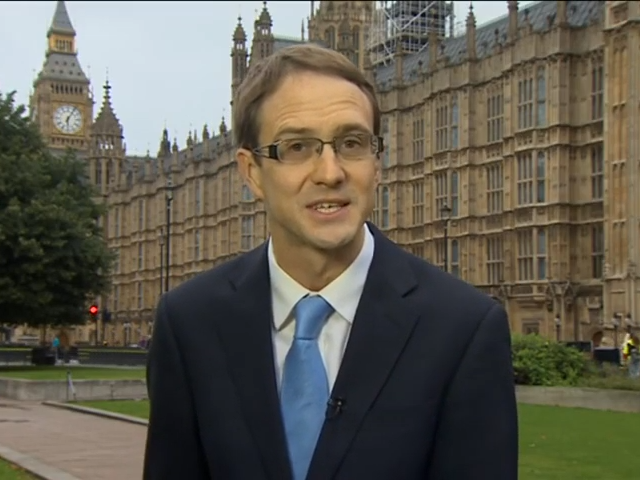BBC’s new political editor honed his journalistic skills as a student quizzing notorious brothel keeper
Cynthia Payne was a madam who became famous when police raided her home in Streatham, south London

BBC’s Chris Mason will have to grill ministers and distil complicated Westminster stories for millions of viewers in his new job as the corporation’s political editor.
But, it can be revealed, the Yorkshireman honed his skills as a student journalist quizzing a rather different interviewee – a notorious brothel keeper.
Mason, who currently hosts Radio 4’s Any Questions?, will be filling Laura Kuenssberg’s shoes after the May elections.
He is reportedly considered a safe pair of hands within the organisation and was praised for his “calm, incisive analysis” by a BBC executive when the move was announced.
A keen student journalist at Cambridge university, the 42-year-old co-founded The Cambridge Student newspaper in the winter of 1999 and held a number of editorial roles.
In an article from the 2 November 2000 issue, Mason interviewed Cynthia Payne, a madam who was put on trial in 1980 for running a “disorderly house”.
Her case attracted national attention because of her clientele, who were said to have included a peer of the realm, vicars, barristers, and a former RAF squadron leader.
The newspaper published alongside the interview a handwritten note apparently penned by Payne which joked: “To Chris Mason Thank you for your past custom!! Cynthia Payne. 27.10.00.”
The message was printed in the paper alongside Payne’s business card, which advertised her roles as an “after dinner speaker”, “sex law campaigner” and an organiser of “ladies’ nights”.
In the piece, the young reporter seemed rather enamoured with the older woman.
He wrote: “There seems to be a warm affection in the British psyche for lovable rogues. And let’s face it, Ms Payne is no Reggie Kray: she brought happiness to her clients, money to her girls, and a smile to the face of the British public.
“All too often we get swept up in the mindless mediocrity of everyday life: an uncompromising ritual of routine that nips any hint of eccentricity in the bud. Cynthia Payne, however, even in her advancing years, is nothing but refreshing, invigorating colour.
“As Julian Clary once commented, ‘The English like eccentrics. They just don’t like them living next door.’ I think he was right.”
One of the particular eccentricities of Payne’s sex parties, highlighted in her trial, was her routine of giving “luncheon vouchers” to her customers. These tokens entitled the bearer to have sex with any of the women in Payne’s establishment.
Payne was convicted for running the “disorderly house” and sentenced to 18 months in prison, which was later reduced to six.
She twice failed in bids to be elected for parliament; winning only 193 votes in the Kensington by-election in June 1988, representing the Rainbow Alliance Payne and Pleasure Party. In the 1992 general election, she took just 145 votes in Streatham.
Towards the end of her life she was reportedly approached by both Andrew Lloyd Webber and Tim Rice with the suggestion of a musical. She died in 2015.
Mason’s interview with Payne had the amusing sub-heading: “Celebrated Madam Cynthia Payne teaches Christopher Mason a trick of two about entertaining one’s guests.”
Introducing readers to his interviewee, Mason wrote at the start of the piece: “It’s an interviewer’s greatest fear. The commission is late, the prep is thin, and there is an unshakeable concern that five minutes into the conversation you are going to have to politely wrap things up, and run away before your embarrassment can catch you.
“After all, the omens were not good. My assignment was to speak to a wrinkling suburban sixty something: surely the epitome of mediocrity, I convinced myself as the encounter neared.
“How that cursory glance down her CV, as I waited to speak to her, shattered my illusions. Cynthia Payne, you see, is no Daily Mail-reading, Volvo-driving, Rotary and golf club member as my prejudices had suggested. Oh no. ‘I never wanted to be conventional,’ she proffers hesitantly, as if it ever needed confirmation.
“Ms Payne, or ‘Madame Cyn’, as the tabloids dubbed her, is no nine-to-five office type.”
The BBC said: “We’re not going to comment on or debate student journalism which belongs in the common room of 20 years ago.”
Subscribe to Independent Premium to bookmark this article
Want to bookmark your favourite articles and stories to read or reference later? Start your Independent Premium subscription today.

Join our commenting forum
Join thought-provoking conversations, follow other Independent readers and see their replies